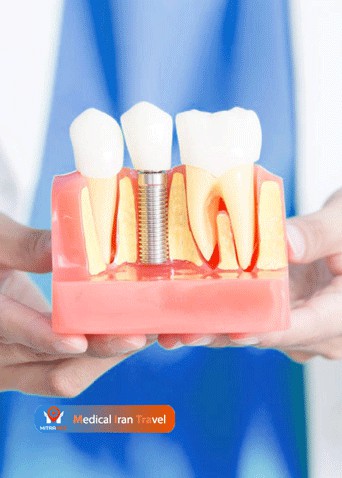
Dental Implants in Iran
The cost of having Dental Implants in Iran is up to 80% cheaper than in Western countries and up to 50% cheaper than in Turkey and Eastern European countries such as Poland & the Czech Republic.
Detail Dental Implants Schedule After Arrival In Iran
Day 1
Arrival in Iran, Mitramed Agent Welcoming, Airport Pick-up, Hotel Check-in and rest, Pre Surgery Consultation, Pre Surgery Tests, Back to Hotel.
Day 2
Transferring from hotel to clinic, Surgery preparation, surgery will be done, Post-surgery recovery room, and Transfering back to the hotel.
Day 3
You will rest in the hotel. You will follow your physician’s instructions regarding your meals and the prescribed medications.
Day 4
You will rest in the hotel. You will follow your physician’s instructions regarding your meals and the prescribed medications.
Day 5
Transferring to the clinic. Surgical sutures removal by the doctor, Recovery instruction check, Back to hotel
Day 6
Hotel check-out, Transfering to Mitramed office. Airport drop-off. This is the starting point of the MitraMed follow-up procedure until a 100 percent recovery is obtained.
IRAN, An Ideal Destination for Dental Implants
Competitive Dental Implants Cost in Iran
The dental implant cost in Iran for each tooth is $400 to $800. The average cost of a dental implant in Iran per tooth is about $500, depending on the materials used and the complexity of the implants.
Implant costs include dental implants inside the gums, attaching the implant, and the placement of the crown on the implant.
The materials used in the implant also have a significant impact on the overall costs.
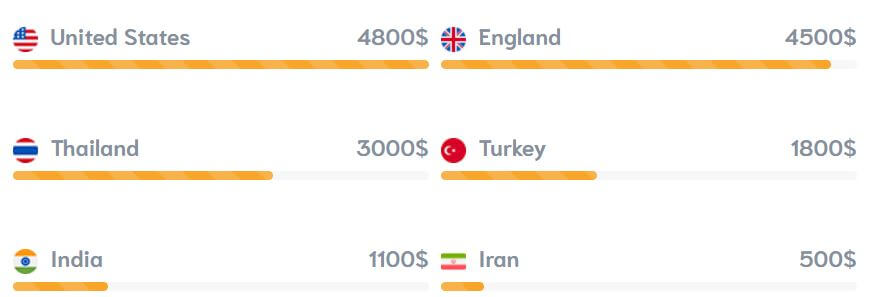
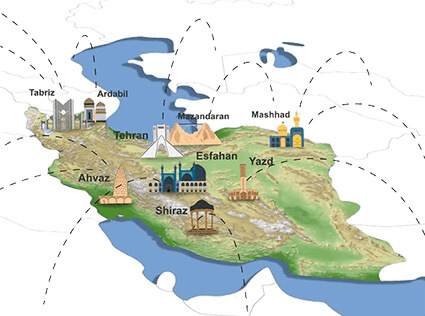
Iran is a Fascinating Tourist Destination with Hospitable & Noble People
Alongside experiencing a successful dental implants in Iran, you can enjoy memorable & pleasurable moments in Iran.
According to the most recent statistics published by UNESCO, Iran is amongst the top 10 countries regarding internationally registered cultural and natural heritage in the world.
Highly Experienced Dentists and Specialists in Dental Implants in Iran
Iranian dentists have obtained extensive experience regarding dental implants. On average, an Iranian dentist may perform over 30 dental implants during the week. This number goes up to approximately 50 successful implants per week during peak times for implant treatment.
According to a study conducted by Rasouli et al., out of the 2,381 cases of dental implants that were carried out between 2002 and 2012 in Iranian dental centers, only 0.8% of the cases have been unsuccessful and 99.2% of dental implant cases in Iran have been carried out successfully.
Leave Your Whatsapp Phone Number

What are Dental Implants?
Dental implants are small anchors, which replace missing teeth or damaged teeth that have been extracted. The implant is surgically placed in the jawbone to act like the root of the lost tooth.
Implants are designed in order to protect the surrounding bones and gums, as well as present an appearance similar to natural teeth for a long time.
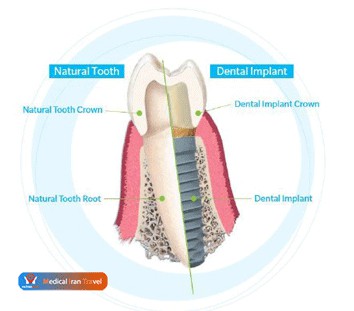
The Steps of Having a Dental Implant in Iran
Pre-treatment Consultation
After evaluating your oral and dental history, your doctor will determine if the implant is right for you or not.
If approved, you will have full consultations with surgery and prosthesis specialists.
Primary Implant Placement:
While you are under local anesthesia or complete anesthesia, your doctor will place an implant in your jawbone.
Over several weeks or months, the surface bone heals and becomes a retainer in its position.
Depending on the specific situation, a minor step may be needed in order to create an opening to observe the generated tooth.
Implant Prosthesis Connection
At this stage, the doctor inserts a post into the implant and soon, an artificial tooth is created and placed at the implant location.
Proper Care
Your doctor will properly advise you on the proper care and maintenance of the new implant before, during, and after the surgery.
By following a regular oral hygiene routine, your implant will function well and present you with a good sense for many years to come.
Dental Implants Types in Iran
An implant specialist in Iran will determine what type of implant you need.
- An Endosteal (Internal) Implant:
This is the most common type of implant and usually consists of small Titanium screws which are placed within the jawbone.
- A Subperiosteal (External) Implant:
If you need an implant but don’t have enough healthy jawbone to support it, your dentist may recommend a Subperiosteal implant under the skin. The implant is placed under the gums and above the jawbone.


Endosteal Implant Alternatives
If the patient’s dentist diagnoses that an Endosteal (internal) implant is not suitable for the person, other options that can be used include the following:
- Implants Under or Around the Bone (Subperiosteal Implants):
Unlike being within the jaw, the implant is placed on or above the bone. - Bone Augmentation (Strengthening):
Strengthening or repairing the bone in the patient’s jaw using additives and bone growth factors. - Sinus Augmentation (Strengthening):
Adding bone to the underside of the sinus is called Sinus Elevation or Sinus Lift. - Ridge Expansion (Jaw Expansion): Added bone grafting at the top of the patient’s jaw
Read More: Jaw Surgery in Iran
The Main Materials Used in Implants in Iran
Titanium has been used for many years to make implants. But with the development of technology and the widespread use of implants, various materials have been produced.
These materials must be resistant to corrosion & failure. Two of the most common types of dental implants include:
1 – Titanium:
This allows the bone to grow. Titanium is a non-allergenic & tissue-compatible substance and its main advantage is that it can adapt to bone and is lighter than most alloys.
2 – Zirconia:
Compared to Titanium, Zirconia is considered to be a new invention and is regarded as the future of dental implants. This substance has been used since the early 1990s. But Titanium implant materials were still common. The implants made of Zirconia consist of one piece and the post and the abutment are connected in the form of one single piece.
Each of these materials has its own characteristics. For instance, Titanium has been tested more and features a high success rate in medical & dental procedures. Titanium’s versatility has made it different.
Dental Implants Techniques
Replacing a Single Tooth with an Implant-Supported Crown.

Replacing Several Teeth with an Implant-Supported Bridge.

Complete replacement of the mandibular (lower jaw) or maxillary (upper jaw) teeth using a fixed or removable Full-Arch restoration.

All on 4 Dental Implants in Iran
There is an implant called “all on 4” for patients who have lost all their teeth. This treatment has also won the Nobel Prize in Chemistry. In this method, 4 implants are utilized for all lower (or upper) teeth. In this method, unlike removable dentures, the teeth are fixed and appear similar to natural teeth.
3D Design of Dental Implants in Iran
A very detailed and precise image of the implant is designed by using software, which the dentist can use to analyze and assess the anatomy of the jaw and determine the best place for the implant before conducting the surgery. This saves time and money and also shortens the duration of treatment.

The Advantages of Dental Implants Over Other Methods
Today, implants are becoming an alternative to traditional dental crowns, dental bridges, and dentures due to their high resemblance to natural teeth and providing a greater sense of comfort for the patient.
Although dentures are more affordable, they can become detached from the mouth which is not desirable. They also adversely affect the experience of the taste of the food. Also, dental bridges were considered to be an ideal option prior to implants, but the main problem is their dependence on natural teeth for support which leads to damage to the supporting natural teeth.
Dental Implant Risks
Just like all other surgeries, a dental implant in Iran has some health risks which are usually rare, minor, and easy to treat.
These risks include:
- Failure in adapting to the bone; is when the implant cannot be placed within the bone in order to provide the initial stability.
- Infection around the implant.
- Damage and puncture may include damage to the adjacent structures such as maxillary perforation, the blood vessels, the tongue, the gums, etc.
- Nerve damage can cause pain, numbness, or itching in surrounding tissues such as your natural teeth, gums, lips, or chin.
- Dead tissues: Adjacent to the implant, there is approximately one dead cell in the tissue edge cells every 20 cases.
In Iran, dental implants are carried out under the strict supervision of skilled specialists, because if any existing bleeding disorders, infections, allergies, medical conditions, and medications are carefully monitored and assessed prior to the surgery, the mentioned complications will very rarely occur and the success rate will be quite high.
Dental Implant Results and Success Rate
The rate of success in dental implants in Iran varies depending on where they are placed in the jaw but in general, dental implants have been successful at the rate of up to 98% and with proper care, these implants can meet your needs until the very last minute.
The success rate of dental implants depends on several factors which include:
- Stability, a mobility rate of less than 1 mm in every direction.
- No gum infections and complete treatment before a dental implant are placed.
- The skill of the doctor in carrying out the dental implant.
- The type of materials used in the dental implant.
- Not smoking.
- The amount of bone density in the jaw bone.
- Enough gum width is required to attach the dental implant.
- Practicing oral and dental hygiene after having the dental implant.
Dental Implants Frequently Asked Questions
We have tried to gather most often questions from our clients regarding dental implants in Iran , however, if you have not received answers to your questions we are more than happy to help, so please do not hesitate to contact us.
Why Mitramed?
- We will assist you to acquire a medical visa.
- Before you make your trip, we will provide you with free advice via sending photos to the medical team.
- You can easily choose from our Packages or pick out your own custom package.
- By choosing the MitraMed team, you will be able to experience having your dental implants in Iran in the shortest time possible & without having to make any previous appointments.
- We are cooperating with the best surgeons in Iran and we will introduce them to you.
- Our activity is supervised by the Iranian Ministry of Health & the Iranian Ministry of Tourism.
- We will be by your side and accompany you after the surgery until you obtain the final quality of your dental treatment.
- We offer the best tourism services including accommodation, transfer, surgical teams & advanced clinics for cosmetic surgery, and personal interpreters & assistants.
What is one day dental implants?
For immediate dental implants or one-day implants, you don’t need to go through the several months of implant infusion to install a tooth crown. In this method, after the fixture (base) is fixed into the jawbone, a temporary crown will be immediately installed on the tooth. Until the fixture is completely infused with the patient’s jawbone, it will stay in its place. In fact, until the permanent dental crown is ready, your tooth won’t be empty.
The temporary dental crown will be designed shorter than the other teeth so there won’t be pressure while chewing food, since the implant and your bone are not infused together, and the implant is not stable. As a result, a little movement of the implant causes a problem in infusion of the bone to the implant and the treatment fails.
The method of implantation is like the usual implant. After connection, an intermediate piece called an abutment is installed on the implant and then the implant and the gingival surface are molded. The cover is immediately designed and created by digital devices and is installed on it. After complete healing and integration of the implant and jaw, the permanent tooth crown will be easily replaced by the temporary cover.
Is dental implants painful?
- No pain should be felt during the surgical procedure due to the use of local anesthesia.
- Feeling post-operation pain is different in different individuals, but most people have the same feeling as having had a tooth extract.
- Before dental implants in Iran, an ice pack is placed on the skin in order to help reduce swelling.
- Usually, a toothache is controlled with medications such as Ibuprofen or acetaminophen.
- Deeper surgeries require stronger medication and more recovery time.
- In addition to painkillers, antibiotics and oral medications will be prescribed for the next few weeks.
How Long Does an Implant Treatment in Iran Take?
The duration of the treatment is different in different cases and will be determined after a dental evaluation and 3D scan have been carried out.
- Without tooth extraction and proper bone volume, the treatment period is a 3 to 4-month period.
- With tooth extraction and proper bone volume, the treatment period is a 4 to 6-month period.
- With tooth extraction and weak bone volume, the treatment period is a period to 6 months or more.
- With tooth extraction and very weak bone volume, the treatment period is a 12-month period or more.
Why is Dental Implants so cheaper compared to the prices in the UK, US, Turkey, India and other countries?
Surgery, accommodation, and tourist services are much cheaper in Iran compared to other countries in the world. This is mainly because of the low value of the Iranian currency (IRR).
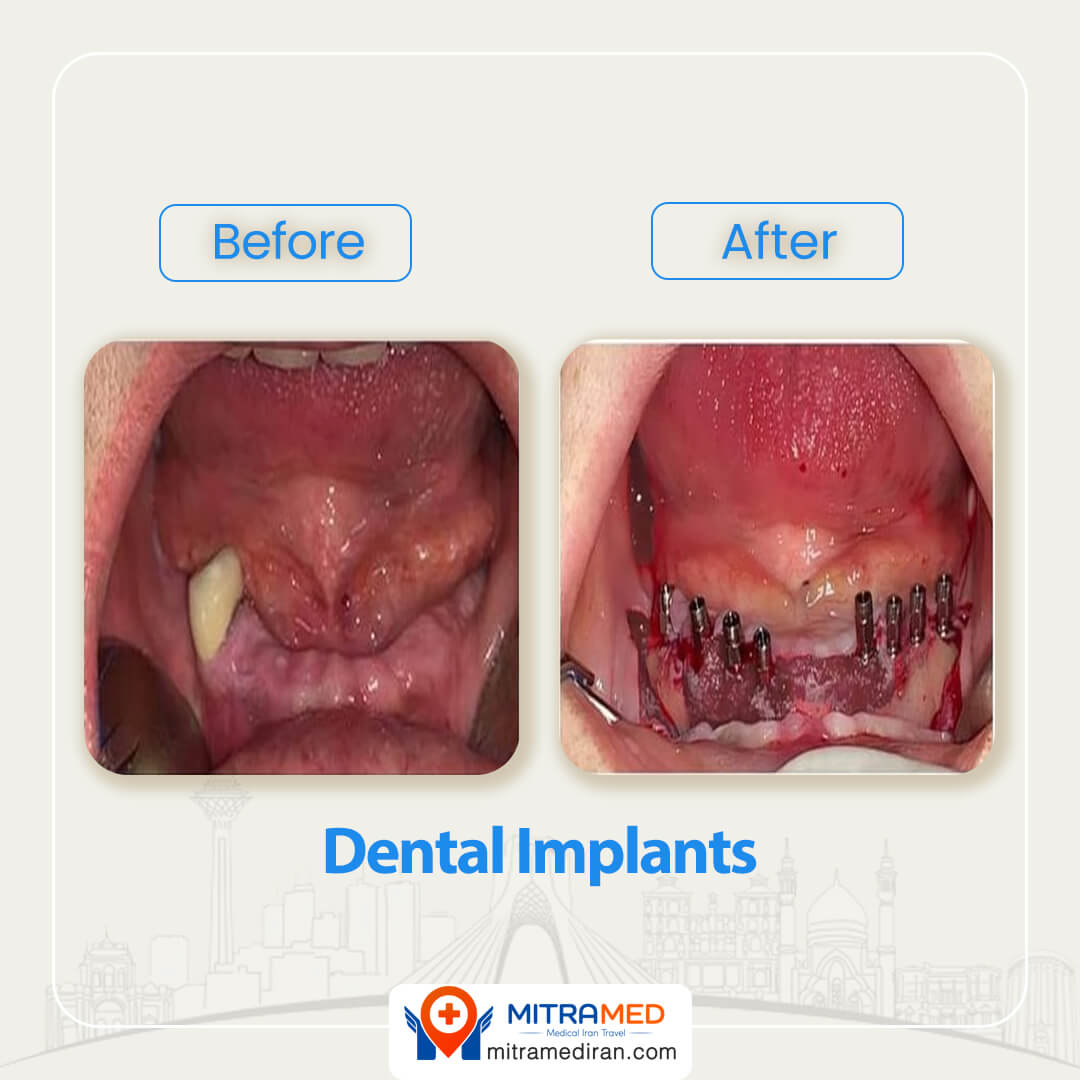
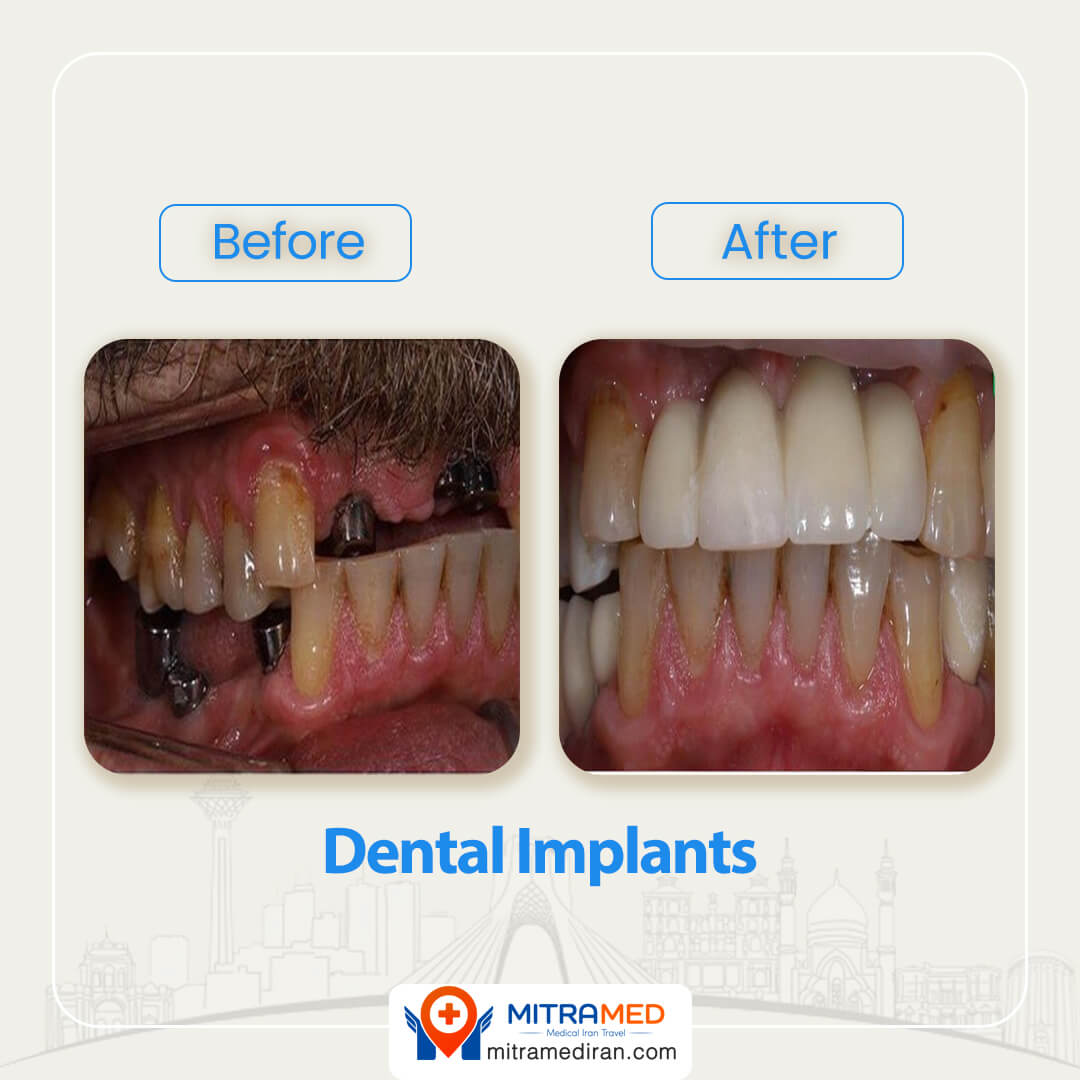
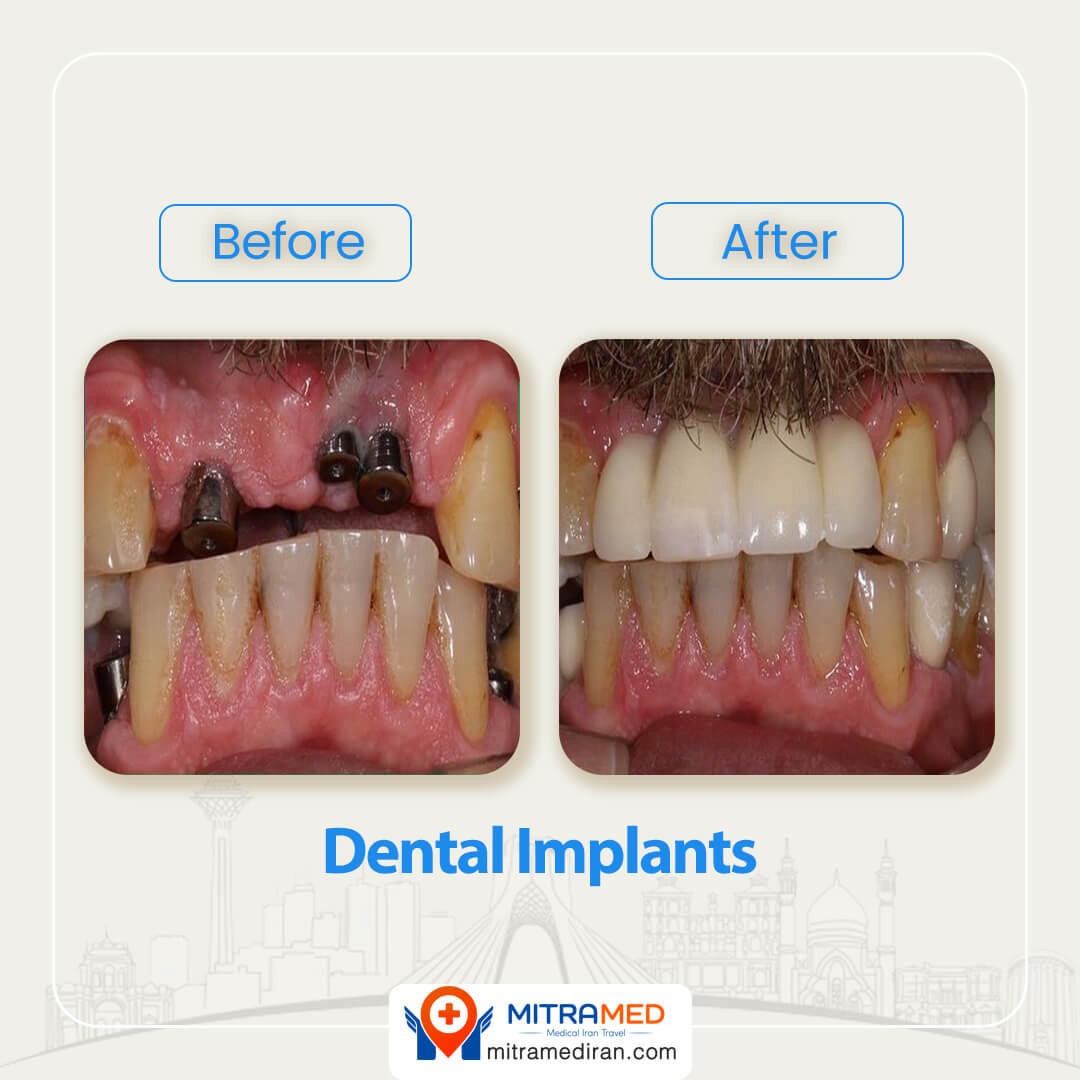
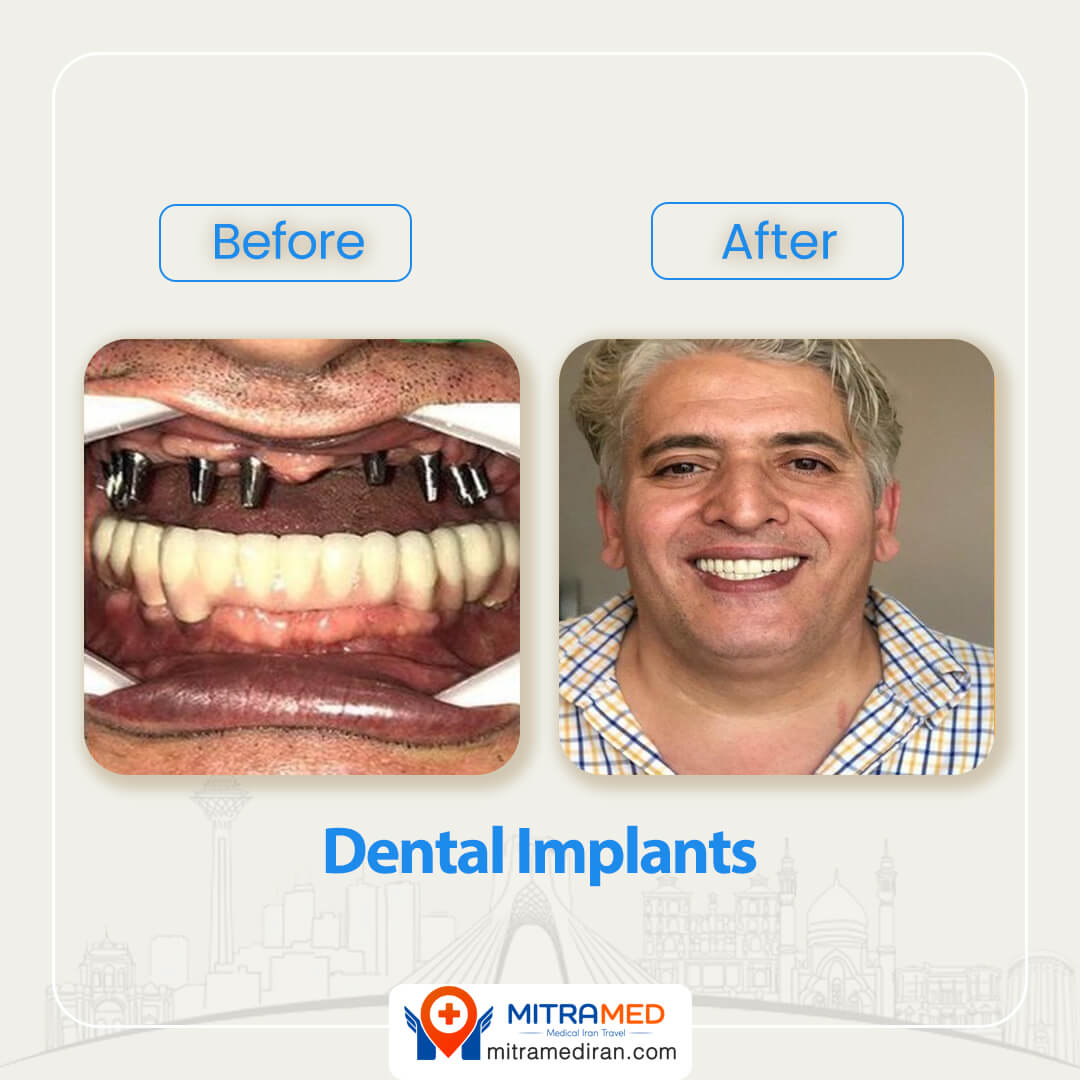
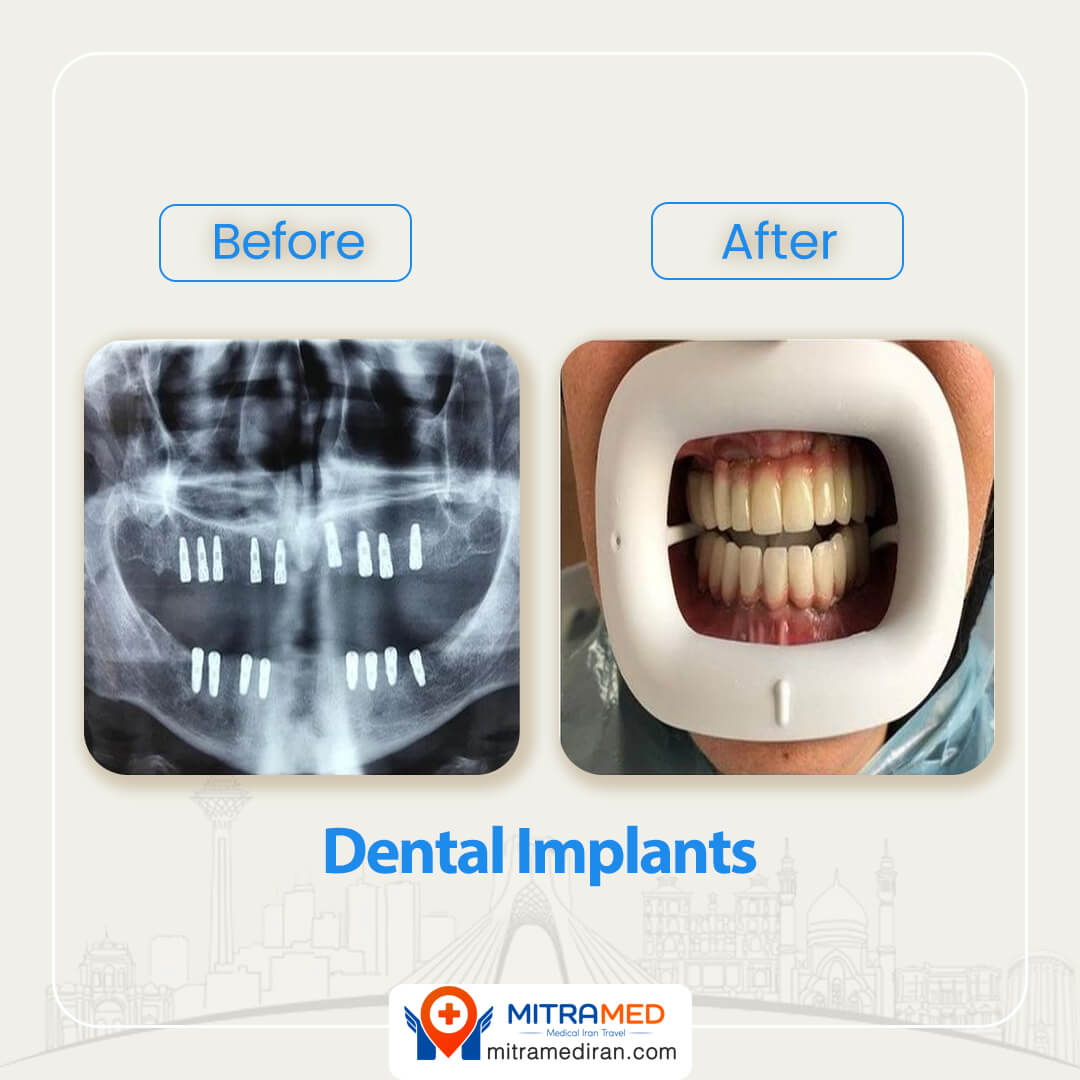
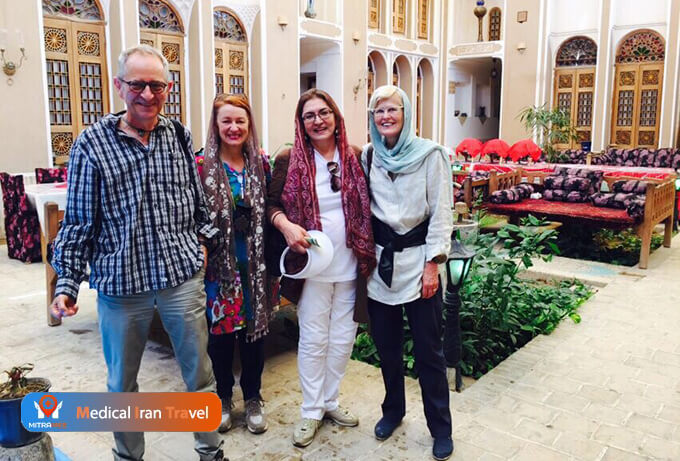
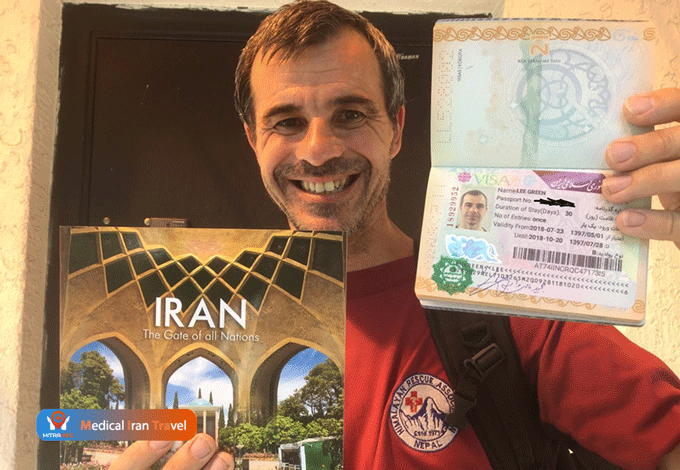
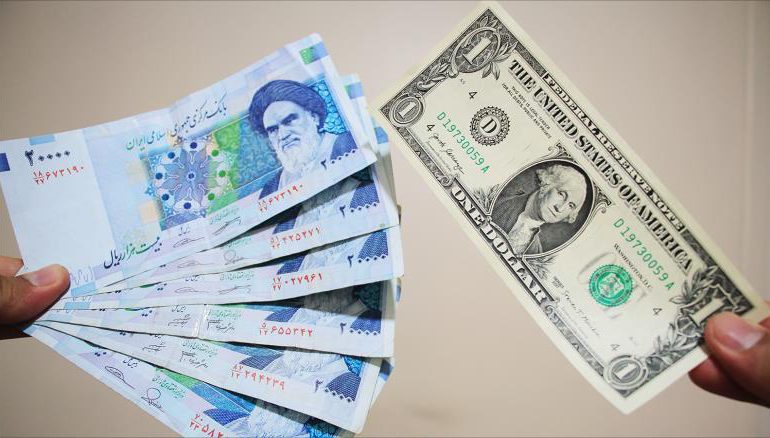
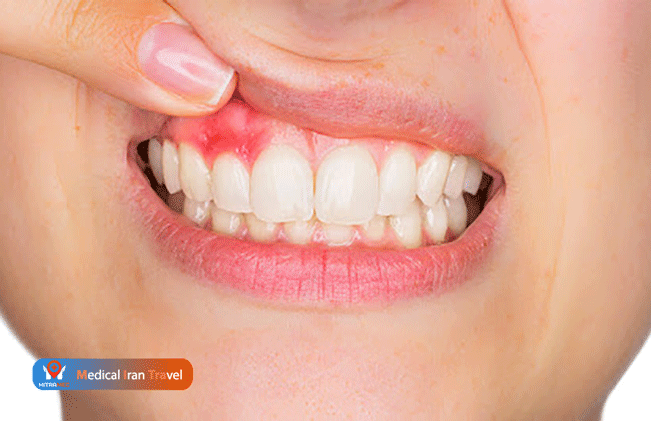
Does smoking background has any effect on the successful rate of dental Implants?
What are the effects of smoking after having dental Implants? is there any negative ones?
Hi Raheem, Yes, The failure rate of implant osseointegration (fusion with the jawbone) is considerably higher among smokers. Read More Here Smoking can also negatively affect dental implants. It impacts healing, osseointegration, and the maintenance of oral hygiene around the implants.